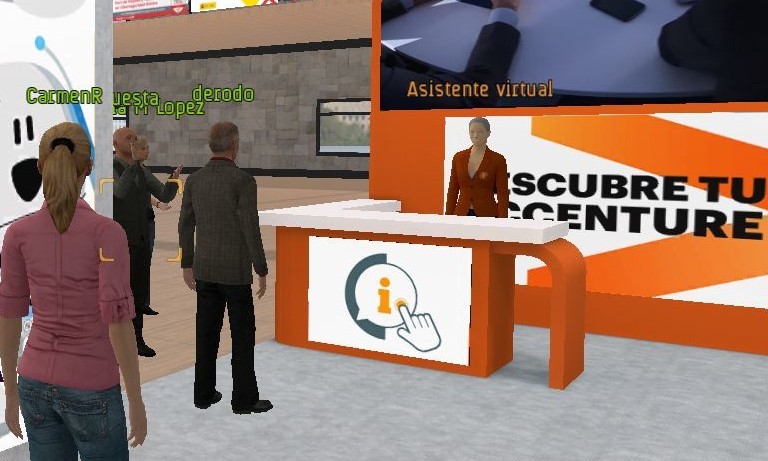Leads generation is the top priority for a company’s marketing specialist. After all, attracting potential clients and sparking interest in services or products is one of the most crucial parts of a business.
However, nowadays the market is constantly changing, and customer behavior does not scape this tendency either. As time goes by, users demand different necessities and search for alternative ways to find solutions.
For that, even if the marketing teams count with powerful tools to generate B2B leads, it is necessary to make the extra effort to find new strategies to generate potential clients. These alternatives should be innovative and give added value to the client’s experience.
Here is where virtual events and fairs have immense potential to attract leads and successfully make the final conversion. Without geographical barriers or time limits, these types of meetings ensure a wide information exchange and have become a gold mine for marketing lead generation.
The advantage of these tools to create leads is that a virtual fair can be used as a strategy on its own or as an extension of an omnichannel marketing strategy. That is, once the company has connected with its target audience through other methods, a virtual exhibition or some kind of online fair can help attract and consolidate potential clients. Thus, it provides an important competitive advantage even in a slow market.
Advantages of Virtual Fairs to Generate B2B Leads
Virtual spaces have opened uncountable opportunities for businesses to commercialize and present its products and services. The greatest exponent can be found in virtual fairs, an option considered as a very powerful marketing tool, able to optimize the engagement of the event attendants and to effectively generate leads.
Its capacity to create solid and lasting relationships between the users and the company, as well as the opportunity to increase the engagement between the brand and the consumers, has fostered the perception of virtual fairs as something positive, efficient and profitable, in comparison to other in-person marketing activities.
All these objectives can be achieved thanks to the advantages that it offers compared to in-person events. These are the main advantages:
- Greater audience: Geographical and time barriers are a great limitation when organizing an event. However, virtual spaces facilitate the attendees to access them remotely from any computer or device with internet connection.
- Great cost reduction: Saving money with virtual fairs is one of the characteristic advantages of virtual events in general. The profitability of these events is lower, as it eliminates recruitment and transportation costs, as well as anything related to the accommodation of the assistants.
- Attraction over the assistant: Virtual fairs are designed to innovate and for innovation, thus, it would not be comprehensible to have virtual events which don’t provide unique alternatives capable of getting the attendees’ attention.
In that sense, the approach offered by Virtway Events is particularly interesting. These are platforms for virtual fairs designed using the latest technology to create unique experiences. Namely, they offer the possibility of using interactive 3D avatars to represent each of the event participants.
- Increase in visibility: When it comes to promoting an event, digital environments allow reaching a bigger audience with a lower investment, and the divulgation speed of online media gives access to hundreds of people which will, later on, even become possible loyal fans of the product or service of the company.
For that, commercial virtual fairs are the best to get more followers, something that has an incalculable value for companies within their strategies to generate new leads.
- Multiple virtual environments: Online fairs enable creating custom-designed events for the company to please future clients, and the environments where these events can take place are almost limitless.
Interactive chats, live webinars or immersive rooms are only a few examples of places where a virtual fair can show all its potential to provide attendees with exceptional experiences in digital environments.
- Measurable results: Everything that happens in a virtual event can be measured during each of its phases. Real-time access to all the data regarding the participants enables the company effective information about ROI, which allows to study and improve the quality of present and future events.
How to Ensure Lead Generation in Virtual Events
Thanks to all the advantages given by an event of this kind, exhibitors are able to attract a larger audience and increase their chances of generating leads.
But, how do they achieve this? The following points will help you achieve this goal:
- On-demand content: One of the most successful elements of a virtual fair is that its content can be made-to-order. This possibility allows creating a richer experience and generating interest
For this reason, it is important to present a great number of opportunities for them to get to know the products and services that are being exhibited through photos, videos, demos, leaflets, electronic books and all kind of digital materials that can be downloaded and checked at any moment.
- Interactive chats: Live chats allow the exhibitors to interact with the fair attendees. Through real-time conversations, the company will be able to provide details about the product, answer questions and exchange commentaries.
This connection creates a closer relationship and exponentially improves the image of the company and its products or services, thus, being closer to its future clients.
- Immersive rooms: Virtual fairs will always include spaces designed for their guests to interact, both with the company and with each other.
But it is not a traditional interaction, therefore, it is necessary to offer the possibility of participating in immersive activities aimed for training. This is the best way for all the attendees to actively collaborate and make their experience even more satisfactory.
Lastly, to ensure lead generation in virtual events, it is necessary to define a follow-up strategy for after celebrating the fair. Then, you will be able to follow potential clients that have attended and know their impression and experience. This is the last step to improve the client’s engagement and create effective leads.




